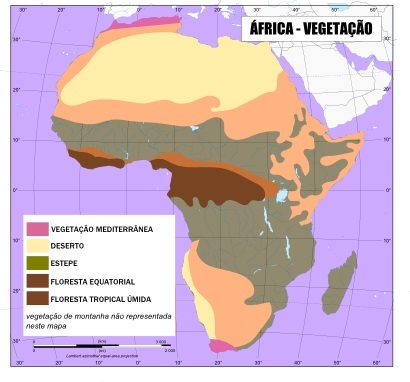With approximately 30.2 million square kilometers, Africa is the third largest continent. This is the poorest region on the planet, housing the countries with the lowest Human Development Index (HDI). The African continent is well known for socioeconomic problems, ethnic conflicts, malnutrition, disease (most of the HIV virus carriers reside in Africa), among other negative aspects, however, little is said about the richness of its soil.
Africa has large mineral reserves, a fact provided by its geological formation, which dates back to the Pre-Cambrian age, predominantly from the Archeozoic and Proterozoic eras. Therefore, this region is formed by very old land, presenting favorable conditions for the formation of ores.
Currently (2010), this continent is home to around 8% of the world's oil and natural gas reserves, with emphasis on the Congo, Egypt and mainly Angola, Algeria, Libya and Nigeria, which are part of the Organization of Petroleum Exporting Countries (OPEC).
Another important mineral found in the African subsoil is uranium – the continent holds 25% of the world's reserves. This material is of fundamental importance for the production of nuclear energy. The biggest producers are South Africa and Gabon. This first country also has large reserves of antimony, diamond, gold (the world's largest producer), manganese, platinum, chromium, among others.
Do not stop now... There's more after the advertising ;)
Among the main African nations that harbor mineral reserves are: Morocco (phosphate), Zambia (copper), Zimbabwe (gold), Guinea (bauxite), Namibia (uranium), Uganda (copper and cobalt), Sudan (gold, silver, zinc, iron, etc.), Botswana, Congo, Democratic Republic of Congo, Central African Republic, and Ghana (Diamond).
With so much mineral wealth, why is the African continent economically poor? The answer is in the form of resource exploitation, since it is transnational corporations from developed nations (United States, Canada and European nations) that benefit from these resources. In this sense, the great imperialist powers enrich themselves and intensify the economic poverty of African countries.
By Wagner de Cerqueira and Francisco
Graduated in Geography
Brazil School Team
Africa - continents - geography - Brazil School
Would you like to reference this text in a school or academic work? Look:
FRANCISCO, Wagner de Cerqueira e. "Africa's Mineral Wealth"; Brazil School. Available in: https://brasilescola.uol.com.br/geografia/riqueza-mineral-Africa.htm. Accessed on July 27, 2021.

